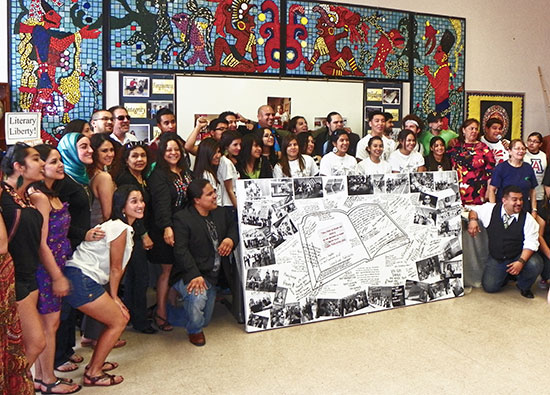‘Librotraficantes’ smuggle banned books into Arizona
Published Mar 29, 2012 7:56 PM
|
Librotra�cantes with Tucson students.
WW photo
|
By Gloria Rubac<0x000A>On the road from Houston
to Tucson, Ariz.
“Librotraficantes” literally means book traffickers, a word created in response to the racist state of Arizona banning Mexican American Studies.
“When Arizona tried to erase our history, we decided to make some more,” explained Tony Diaz, founder of Nuestra Palabra, Latino Writers Having Our Say, which organized the Librotraficante Caravan from Houston to Tucson, Ariz. during the 2012 spring break. More than 1,000 “wet books” were smuggled across the Arizona border and set up for underground libraries in four cities.
“This is only the beginning,” said Diaz, aka El Librotraficante. “Arizona legislators need to know the whole world is watching. This is just the first chapter in a future book about this civil rights movement that some regime may want to ban someday, just as the book ‘Chicano!’ about the Mexican-American Civil Rights movement of the 1960s, is now prohibited.”
The caravan of activists, authors, teachers, students and professors, along with a film crew and imbedded journalist Belinda Acosta, left Houston on Monday, March 12, after hosting a press conference at Casa Ramírez Folk Art Gallery. A few hours later they set up book stands filled with banned books and held another press conference, which featured banned authors Lorna Dee Cervantes and Carmen Tafolla, in front of the Alamo in downtown San Antonio.
At the press conference, Lee College Honors Coordinator John Britt gifted Diaz with a straw hat once owned by Cesar Chavez. Chavez gifted it to a Lee College dean in 1962 during a United Farmworkers Union march. Britt said he was giving “this little piece of Texas history to Diaz because he walks in the spirit of Chavez.”
This was just the first of many emotional and love-filled occurrences on the road to Tucson.
More than 500 people filled the halls in El Paso, Texas, and Albuquerque, N.M., for Banned Book Bashes. Writers read their own works or some of the banned works to the standing-room-only crowds.
In the small but historic town of Mesilla, N.M., the Librotraficantes were hosted for breakfast by writer Denise Chavez. Later the caravan was invited into the beautiful adobe home of the “godfather” of Chicano/a literature, Rudolfo Anaya, whose book, “Bless Me, Ultima,” is banned in Arizona. Anaya gave his blessing and then served a lavish lunch to the caravan members and thanked them for bringing banned books into the public eye.
What began only two months ago as a Twitter post quickly grew into a movement to stop the racist policies in Arizona that will deny students their history, culture and literature.
Ban spurs struggle
Arizona has outraged not only Chicano/a students in the Mexican American Studies program in Tucson, but students and adults from coast to coast in the U.S. On Jan. 10, Arizona State Superintendent of Public Instruction John Huppenthal — long opposed to ethnic studies — decreed the MAS program a violation of Arizona House Bill 2281 and suspended it indefinitely.
Racist Arizona legislators were likely trying to prevent Latinos/as from becoming empowered with knowledge when they passed HB 2281. The law prohibits courses which, authorities deem, “promote the overthrow of the United States government,” “promote resentment toward a race or class of people,” “are designed primarily for pupils of a particular ethnic group,” or “advocate ethnic solidarity instead of the treatment of pupils as individuals.”
The Tucson Unified School District found only one course that dangerous: Mexican American Studies. All Mexican American Studies classes were cancelled in January. The books taught in that course were ordered removed from classes, creating a de facto ban.
“Removing books by our most beloved authors in front of students during class time was a cultural offense on the same level as denying Rosa Parks a seat at the front of the bus,” Diaz explained. “This was so striking, that we had to respond. The Librotraficante Caravan to smuggle books back into Arizona was born. In the process, we have sparked a nationwide movement.”
Arizona legislators became expert at making humans illegal in 2010 with SB 1070, which outraged many and generated huge May Day demonstrations around the country. “But they have gone too far,” Diaz continued, “by making our books — our thoughts — our culture — our history — illegal.”
The majority of the books that are banned are by Chicano/a authors, but also included are Howard Zinn, Mumia Abu-Jamal and Shakespeare.
Right now in Tucson, high school students and their teachers have filed a lawsuit saying that SB 2281 is unconstitutional. A hearing was held on March 13, but no ruling is expected for 30 days. The court said that the 11 teachers who had filed the lawsuit had no standing to sue, so the students are on their own in this historic legal challenge.
Meanwhile, the Librotraficantes are beginning Phase 2 of their goals: setting up the underground libraries in Houston, San Antonio, Albuquerque and Tucson; setting up a Librotraficante speakers bureau; organizing campaigns for school boards in each of the six cities that were visited; planning a Librotraficante Book Festival; raising money for a First Amendment Fund to help attorneys; and inspiring Ph.D.s in Librotraficante Studies.
Articles copyright 1995-2012 Workers World.
Verbatim copying and distribution of this entire article is permitted in any medium without royalty provided this notice is preserved.
Workers World, 55 W. 17 St., NY, NY 10011
Email:
[email protected]
Subscribe
[email protected]
Support independent news
DONATE


